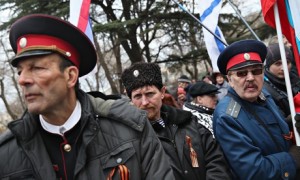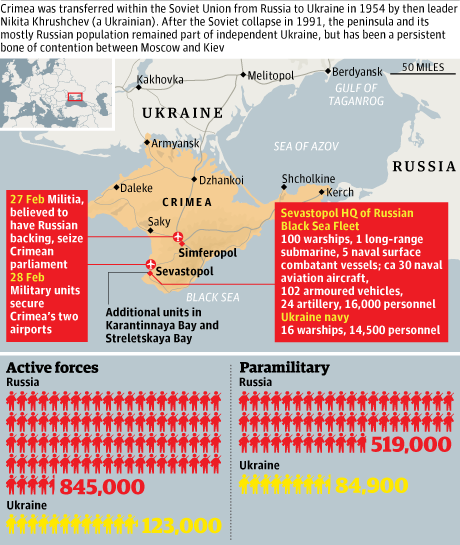 Heightened Russian military activity in Crimea on Friday prompted a stern warning from President Obama and a deepening sense of crisis among the leaders of the new Ukrainian government in Kiev.
Heightened Russian military activity in Crimea on Friday prompted a stern warning from President Obama and a deepening sense of crisis among the leaders of the new Ukrainian government in Kiev.
U.S. officials said Russian troops had entered Crimea, and Obama told reporters Friday evening that he was “deeply concerned by reports of military movements” and that there “will be costs for any military intervention.”
Earlier in the day, the new Ukrainian government said that hundreds of soldiers in green camouflage, without insignia but carrying military-style automatic rifles, had taken over two airports in Crimea. Regularly scheduled flights continued, at least until nightfall, when the airspace above Crimea, a region of Ukraine with deep ties to Russia, was suddenly declared closed.
Internet videos of Russian military helicopters flying over Crimea’s muddy winter fields went viral Friday. Russian IL-76 planes suspected of carrying 2,000 troops landed at a military base in Gvardiysky, near the regional capital of Simferopol, according to Crimea’s ATR television.
Russia’s Foreign Ministry said Moscow had informed Ukraine that it would be moving armored units from its Black Sea navy base in the city of Sevastopol deeper into Crimean territory to protect its operations.
In his remarks, Obama avoided confirming the Russian military movements. But U.S. officials said that confirmation of an influx of troops had prompted the president to speak.
“Any violation of Ukraine’s sovereignty and territorial integrity would be deeply destabilizing, which is not in the interests of Ukraine, Russia or Europe,” Obama said.
Whether the Russians were coming, or already here, consumed an anxious new government in Kiev and the residents of Crimea.
The armed men at the airports refused to answer any questions. Residents and outside experts speculated that they might be local paramilitaries, security contractors or even members of an anti-riot police unit that was blamed for the deaths of protesters who packed Kiev’s Independence Square in recent months, leading to the ouster last week of President Viktor Yanukovych. The unit, called the Berkut, was disbanded by the Ukrainian parliament this week and then welcomed to Crimea as heroes.
The men also could have been Russian troops, including members from special anti-terrorist squads used to protect the Russia’s Black Sea Fleet, which is anchored here. Units from the Russian fleet are often seen on the highways here.
The Ukrainian parliament demanded that Russia halt what lawmakers described as violations of Ukraine’s sovereignty and territorial integrity.

“What is happening can be called an armed invasion and occupation. In violation of all international treaties and norms. This is a direct provocation for armed bloodshed in the territory of a sovereign state,” said Arsen Avakov, Ukraine’s new interior minister.
The U.N. Security Council held an emergency, closed-door meeting Friday in response to a request from Ukraine’s U.N. ambassador, Yuriy Sergeyev, who cited “the deterioration of the situation” in Crimea.
The U.S. officials, speaking on the condition of anonymity about internal deliberations, declined to provide numbers or specific locations of Russian deployments. Sergeyev told the Security Council that there had been an “illegal crossing [of] the borders by Russian military transport aircraft IL-76, about 10 of them, and that 11 military attack helicopters had also violated Ukrainian air space.”
The administration official said options being considered by the United States and its European partners if the Russians do not pull back included canceling attendance at the June G-8 summit to be held in Sochi, site of the Winter Olympics, and rejecting Russian overtures for deepening trade and commercial ties. The official also cited an indirect impact on the value of the ruble.
There was no overt discussion of a Western military response. Asked what Ukraine wanted the international community to do, Sergeyev told reporters after the Security Council meeting: “We want you to help us bring the truth around the world. . . . Political support — do everything possible in insurance of preventive diplomacy. Still we have a chance to stop the negative developments . . . with strong voice around the world.”
The council decided to send a mediator to Ukraine and indicated that it may hold further meetings..
In a speech Friday evening, Ukraine’s interim President Oleksandr Turchynov accused Moscow of “trying to provoke” Kiev into an “armed conflict.”
Turchynov said the Russians were pursing an “Abkhazia plan,” suggesting that Moscow was interested in a reprise of its 2008 war with Georgia, where it wrested control of two breakaway republics, South Ossetia and Abkhazia.
But Ukraine is much larger — and far more complicated — perhaps requiring a more subtle strategy. That line of thinking led to speculation that Russia was encouraging loyal civilian forces to put on unmarked uniforms, take up arms and hold ground for Russian troops, should they be deployed.
Ukraine’s new leaders assert that troops from the Black Sea Fleet had also blocked entrances to Belbek’s dual civilian and military airport near the city.
A spokesman for the Black Sea Fleet denied the reports that its troops were involved, according to the Interfax news agency.
“No subdivision of the Black Sea Fleet has been advanced into the Belbek area, let alone involved in blocking it,” the spokesman said. “Given the unstable situation around the Black Sea Fleet bases in the Crimea, and the places where our service members live with their families, security has been stepped by the Black Sea Fleet’s anti-terror units.”
At the Belbek airport, armed men and a military transport truck blocked the entrance. Whoever the men were, they did not resemble the more motley civilian self-defense militias operating here. They were trained soldiers. When a man who appeared to be a Russian officer with two bodyguards approached them, they spread out in defensive, flanking positions, squatted, their fingers off the triggers and waited for orders.
A convoy of armored personnel carriers stopped alongside a major highway here, and soldiers inside one of the vehicles said in a brief interview that they were Russian Federation troops, from a base in the Krasnodar region, about 300 miles to the east in Russia.
In the Balaklava district near Sevastopol, at least 20 men wearing the uniform of the Black Sea Fleet and carrying automatic rifles surrounded a Ukrainian border guard post Friday, initiating a tense standoff with the border police inside, Reuters news agency reported.
In Moscow, Russian President Vladimir Putin broke his week-long silence on Ukraine with a mixed message. He ordered Russian officials to consult with other nations as well as the International Monetary Fund on means of financial assistance for Ukraine. He also said that efforts to maintain and promote trade between Russia and Ukraine should continue.
At the same time, Putin said Moscow would consider the possibility of sending humanitarian supplies to Crimea.
Secretary of State John F. Kerry spoke Friday with Russian Foreign Minister Sergei Lavrov.
“We raised the issue of the airports, raised the issue of armored vehicles, raised the issue of personnel in various places,” Kerry said. “And while we were told that they are not engaging in any violation of the sovereignty and do not intend to, I nevertheless made it clear that that could be misinterpreted at this moment, and that there are enough tensions that it is important for everybody to be extremely careful not to inflame the situation and not to send the wrong messages.”
Washington Post
Photo: Pro-Russian Cossacks rally outside the Crimean building in Simferopol. Ukraine has accused Russia of invading the peninsula. Photograph: Sean Gallup/Getty Images

Leave a Reply
You must be logged in to post a comment.